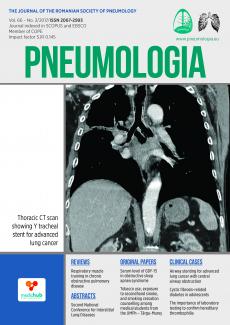Reviews
Natural course of preneoplastic bronchial lesions
Ruxandra Ulmeanu, Ruxandra Rajnoveanu, Eugenia Halic, Oana Deleanu, Florin MihaltanNatural course of preneoplastic bronchial lesions Abstract
Advances in endoscopic technology have improved the detection of precancerous bronchial lesions associated with the occurence of proximal squamouscell lung cancer (SCC)in high-risk individuals for broncho-pulmonary neoplasm. The debates and controversies regarding the control and treatment of intraepitelial bronchial lesions is due to the fact that the regression rate of all preneoplastic bronchial lesions is 54%. But the progression to carcinomain situ or to cancer is significantly higher for severe dysplasia, than for preneoplastic lesions showing lower-grade dysplasia, such as squamous metaplasia and mild or moderate dysplasia. The progression rate to carcinoma in situ or cancer with squamous cells varies between 19% and 46% forpatients with severe dysplasia. The diagnosis and resection of pulmonary cancer in incipient stages increases spectacularly the survival rates of theresected patients, by comparison to the non-operated patients.
Keywords: bronchoscopy, preneoplastic lesions, cancer in situ
Natural course of preneoplasic bronchial lesions
The fundamental mechanisms of metastatic spread and chemotherapy resistance in lung cancer
Ciprian Tomuleasa, Gabriel Kacso, Olga Soritau, Sergiu Susman, Bobe Petrushev, Mihaela Aldea, Rares Buiga, Alexandru IrimieThe fundamental mechanisms of metastatic spread and chemotherapy resistance in lung cancer Abstract
Lung cancer is the leading cause of cancer-related death in the European Union and the United States, accounting for about one third of all cancerdeaths. Primary lung cancer may arise from the central (bronchial) or peripheral (bronchiolo-alveolar) compartment of the lung, but the origins ofthe different histological types of primary lung tumours are not well understood and described in medical literature. Current investigation in the fieldof cancer research have focused on the "cancer stem cell" hypothesis as stem cells are belived to be crucial players in the homeostasis of all adult tissues.Even if the role of stem cells in lung carcinogenesis is not clear yet, numerous studies indicate that lung cancer is not the result of a sudden transformingevent, but of a multistep process of molecular changes of the primordial stem cell niche, leading to the development of noeplasia. In the currentreview, we present state-of-the-art research in the field of lung stem cell biology, with a special emphasis on lung cancer emergence, development, metastasisand multidrug resistance.
Keywords: lung cancer, cancer stem cells, metastasis and resistance to conventional therapy




 Article
Article